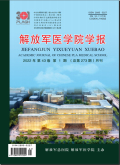解放军医学院学报2024,Vol.45Issue(8):817-823,831,8.DOI:10.12435/j.issn.2095-5227.2024.100
基于增强磁共振成像影像组学的肝细胞癌靶向联合免疫治疗疗效预测研究
Radiomics analysis on contrast-enhanced magnetic resonance imaging for predicting treatment response of targeted-immune systemic therapy in hepatocellular carcinoma
摘要
Abstract
Background Targeted-immune systemic therapy(TIST)is currently the first-line systemic treatment for hepatocellular carcinoma(HCC).However,there is a lack of reliable biomarkers for predicting efficacy and identifying potential beneficiaries.Objective To explore the feasibility of using Magnetic Resonance Imaging(MRI)radiomic features for response prediction.Methods This study included 191 HCC patients who received targeted immunotherapy at the Department of Hepatobiliary and Pancreatic Surgery,Chinese PLA General Hospital,from January 2019 to January 2023.The patients were randomly divided into training cohort and validation cohort at a 7:3 ratio.All patients underwent dynamic contrast-enhanced MRI before treatment and during follow-up.Treatment efficacy was assessed according to RECIST1.1 criteria,with complete or partial response considered effective.Tumor regions were delineated on pre-treatment dynamic contrast-enhanced MRI images,and radiomic features were extracted.Meaningful radiomic features were selected using the Least Absolute Shrinkage and Selection Operator(LASSO)algorithm.Various machine learning algorithms,including logistic regression,k-nearest neighbor(KNN),naive Bayes,neural network,support vector machine(SVM),decision tree,XGBoost,and random forest were used to construct radiomic prediction models.The performance of each model was evaluated using receiver operating characteristic(ROC)curves and confusion matrices.The prognostic predictive value of the models was analyzed using Cox regression and Kaplan-Meier curves.Results Medical data of 191 patients were collected,including 163 male patients(85.3%)and 28 female patients(14.7%),with a median age of 55(range:24-74)years.The overall objective response rate was 30.4%.There were 133 cases in the training set and 58 cases in the validation set,with no statistically significant differences in gender and age between the two groups(P>0.05),the objective response rates in training cohort and validation cohort were 30.1%and 31.0%,respectively.Eight ML models were successfully constructed based on the selected radiomic features.In the training cohort with 10-fold cross-validation,the AUC values for the KNN,naive Bayes,and SVM models were 0.826,0.810,and 0.801,respectively.In the validation cohort,the AUC values were 0.830,0.836,and 0.825,respectively.Survival analysis showed that the progression-free survival of patients predicted to have effective treatment by the above three models was significantly prolonged(P<0.05).Conclusion Radiomic models based on machine learning algorithms and contrast-enhanced MRI can accurately predict the efficacy of TIST in HCC patients,demonstrating potential utility in assisting clinical decision-making.关键词
肝细胞癌/免疫治疗/影像组学/预测模型Key words
hepatocellular carcinoma/immunotherapy/radiomics/predictive model分类
医药卫生引用本文复制引用
姚致远,赵文超,张恭,柳俨哲,李悦,肖朝辉,夏念信,刘荣..基于增强磁共振成像影像组学的肝细胞癌靶向联合免疫治疗疗效预测研究[J].解放军医学院学报,2024,45(8):817-823,831,8.基金项目
科技创新2030重大项目(2021ZD0113301) (2021ZD0113301)

